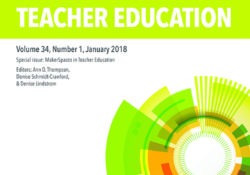eric.ed.gov har udgivet: HIPPY targeted parents of children zoned to 100 Houston Independent School District (HISD) elementary campuses during the 2018-2019 academic year, which reflected an increase from 80 campuses the previous year. Academic performance of students whose parents participated in HIPPY was assessed using the kindergarten 2018 Logramos and Iowa assessments, the prekindergarten CIRCLE assessment, and the combined English and Spanish STAAR 3-8. HIPPY kindergarten students attained higher mean normal curve equivalent (NCE) scores on the Logramos reading and mathematics subtests compared to the district, and comparable Iowa mathematics subtest scores as the district. CIRCLE results revealed that the majority of HIPPY students met benchmark by EOY on English and Spanish mathematics subtests. However, by EOY, students’ performance fell below the district on most CIRCLE English math subtests. Students… Continue Reading →
Like this:
Like Loading...
eric.ed.gov har udgivet: Homes have remarkable possibilities to act as science learning environments for young children (3 – 6 years old). This qualitative case study investigated what kind of support parents need to do online science activities with their children at home. Data consisted of parent’s theme interviews (n=7). As a main result, a model of parents’ need for support was produced. The model contains three dimensions: 1) the affective dimension, 2) the knowledge and skills dimension and 3) the organizational dimension. Parents’ own affective experiences, organization of the experiments and finding time to do experiments are important factors to consider, when looking at parents’ willingness to engage in science activities with their children. The parents might not necessarily be content with only the child’s interest in experimenting as a… Continue Reading →
Like this:
Like Loading...
tandfonline.com har udgivet en rapport under søgningen “Teacher Education Mathematics”: Link til kilde
Like this:
Like Loading...
tandfonline.com har udgivet en rapport under søgningen “Teacher Education Mathematics”: Link til kilde
Like this:
Like Loading...
eric.ed.gov har udgivet: This study investigated the potential of an approach to involving families in regular integration of math into home life, addressing the following: When families are given math-related games unconnected with children’s school, does what parents believe impact the extent to which their families play the games, and how do parents describe their family’s learning with the games? We distributed games integrating math and U.S. geography to 30 parents with children aged 7 to 13. Over four months, we followed the extent and nature of families’ playing of the games. Families with children under 10 were more likely to continue playing over time; parent education and occupation did not relate to extent of play. Parents described a rich, shared educational experience that they and their children shaped to… Continue Reading →
Like this:
Like Loading...
tandfonline.com har udgivet en rapport under søgningen “Teacher Education Mathematics”: ABSTRACT ABSTRACT The following chapter will discuss the relation between home computer history and computer programming – with a focus on game programming. The nurseries of the early 1980s are the origins of the later computer game industry and the private use of microcomputers becomes an essential part of the ‘playful’ exploration and emancipation of technology. This is why the contribution that home computing added to the history of digital economics, culture and even thought cannot be estimated high enough. After the definition of central terms and discussing the main problems of the historiography of technology and computing, the main topic separated in decades will be portrayed. The milestones of home computer technology will be linked to the scenes and (sub)cultures… Continue Reading →
Like this:
Like Loading...


